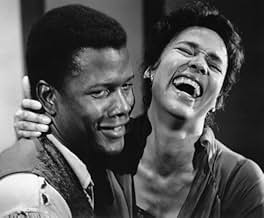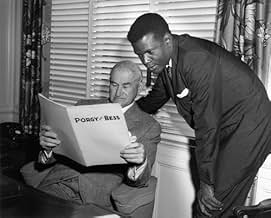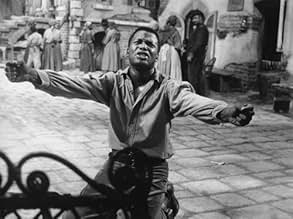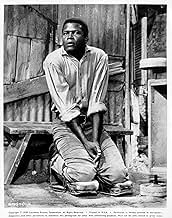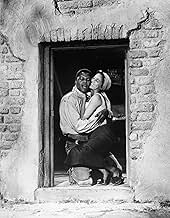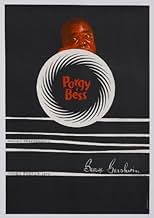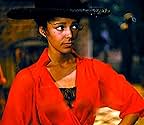A woman whose past is scorned by nearly everyone around her meets a man who'd love her regardlessly - if only everyone else would allow them to.A woman whose past is scorned by nearly everyone around her meets a man who'd love her regardlessly - if only everyone else would allow them to.A woman whose past is scorned by nearly everyone around her meets a man who'd love her regardlessly - if only everyone else would allow them to.
- Won 1 Oscar
- 4 wins & 10 nominations total
Featured reviews
The Seattle International Film Festival was fortunate enough to arrange a screening of a recently discovered 70mm print, going so far as to fly it in from Germany. It was a bit faded, the sound could stand to be remastered, scores of frames are missing, and it has German subtitles, but all in all it was a special treat to see a film unlikely ever to be made publicly available again.
But I'm rather mystified as to why the rights are still in dispute. There's nothing overly offensive here, neither politically nor artistically. Unfortunately, neglect and apathy are probably to blame... it must be said that, while notable, the film itself fails to fully communicate the passion of this most American of operas. It's more of a historical artifact now.
The audience was most delighted by Sammy Davis, Jr. in a role that seems to have been conceived specifically for him. Rarely has an actor been so perfectly suited for a part. Unfortunately, Mr. Davis' persona eventually overwhelms the character- but one can't be certain if this is due more to his actual performance or to the peculiar place our image of him now occupies in popular culture.
Sidney Poitier was 10-15 years too young for Porgy, but acquits himself nicely (though he is dubbed less than precisely). Dorothy Dandridge is just right- but is denied Bess' climatic scene, which takes place offscreen. Best of all is Pearl Bailey, who gets only a few chances to make an impression but takes full advantage of them. The scene in which she is interrogated by the policemen is so funny, it practically derails the movie.
The songs have been pared down, some making only a cursory appearance, and the staging is static. These choices, commercial in nature, rob the film of the power it should have. Perhaps another movie will one day do justice to the opera.
In this "Porgy and Bess", the portrait of Catfish Row is what is most moving. This community mourns, celebrates together and protects itself from outsiders. When the detective grumbles "nobody lives here", it's quite apparent why the inhabitants of Catfish Row would want him to believe that.
But I'm rather mystified as to why the rights are still in dispute. There's nothing overly offensive here, neither politically nor artistically. Unfortunately, neglect and apathy are probably to blame... it must be said that, while notable, the film itself fails to fully communicate the passion of this most American of operas. It's more of a historical artifact now.
The audience was most delighted by Sammy Davis, Jr. in a role that seems to have been conceived specifically for him. Rarely has an actor been so perfectly suited for a part. Unfortunately, Mr. Davis' persona eventually overwhelms the character- but one can't be certain if this is due more to his actual performance or to the peculiar place our image of him now occupies in popular culture.
Sidney Poitier was 10-15 years too young for Porgy, but acquits himself nicely (though he is dubbed less than precisely). Dorothy Dandridge is just right- but is denied Bess' climatic scene, which takes place offscreen. Best of all is Pearl Bailey, who gets only a few chances to make an impression but takes full advantage of them. The scene in which she is interrogated by the policemen is so funny, it practically derails the movie.
The songs have been pared down, some making only a cursory appearance, and the staging is static. These choices, commercial in nature, rob the film of the power it should have. Perhaps another movie will one day do justice to the opera.
In this "Porgy and Bess", the portrait of Catfish Row is what is most moving. This community mourns, celebrates together and protects itself from outsiders. When the detective grumbles "nobody lives here", it's quite apparent why the inhabitants of Catfish Row would want him to believe that.
I first saw the opening of Otto Preminger's "Porgy and Bess" on TV, probably some time in the early 80s, and my younger self found it a bit slow, despite the timeless music. I turned it off
Last night, an extremely rare, cobbled together print screened at the L.A. Cinematheque and it was a bit of a revelation. The performances are strong and memorable. Dorothy Dandridge brings a great deal of vulnerability, strength and subtle (at least by today's standards) eroticism to her part. Sidney Poitier is said to be uncomfortable with the movie, but his performance is terrific, as is Pearl Bailey. Even better are Sammy Davis as the amoral, cat-like Sportin' Life and Brock Peters as the villanious bully Crown.
Still, I'm no fan of Preminger's earlier, leaden -- and far easier to see -- "Carmen Jones." Porgy and Bess" is far superior to that less controversial film -- though that may have to do with the fact that the source material is also far superior.
As seen last night, this is a sturdy but far from perfect work. Not all of the moments quite come alive, and there is some awkwardness in the way the film mixes the overtly stylized Catfish Row set (beautifully done by Oliver Smith) with actual locations. Also, even to my rather untrained ear, some brief portions of the score seem unduly popularized.
Moreover, while this doesn't detract from the achievement of the filmmakers -- Preminger's decision to film almost entirely in wide shots, with no close-ups and occasional medium shots, no doubt rendered it unwatchable on TV "panned and scanned" and may doom it even on widescreen DVDs if it gets the restoration it deserves. On smaller screens, we won't be able to make out the many details that are crucial to the way Preminger staged the film.
Also, the mix heard last night was odd. Many of the vocals, particularly on the opening "Summertime" seemed unduly soft and were overwhelmed by the instrumental music. Perhaps this can be fixed in a restoration.
There is the issue of the film's racial politics. Personally, I see nothing wrong with it, at least in a contemporary context. At the time when so few films depicted strong African-American characters, this may have seemed an unfortunate choice for a big-budget Hollywood film. And, while there may not be much "empowering" here, these are recognizable human beings that are not racial stereotypes. These are operatic characters who make poor choices because that's what tragic characters do. That alone made it a giant stride forward at the time.
In a modern context where strong and heroic African-American characters are less rare (though still not common enough), these characters seem nothing more nor less than human. They truly could be poor and undereducated people of any ethnic background.
Thorny politics aside, the original work is undoubtedly one of the truly great achievements of American music and (secondarily) theater. Poitier, Davis, Dandridge, Peters and, yes Pearl Bailey, were all amazing performers who we'll never see the likes of again. This less than perfect but still solid film clearly deserves to be seen and treasured.
Last night, an extremely rare, cobbled together print screened at the L.A. Cinematheque and it was a bit of a revelation. The performances are strong and memorable. Dorothy Dandridge brings a great deal of vulnerability, strength and subtle (at least by today's standards) eroticism to her part. Sidney Poitier is said to be uncomfortable with the movie, but his performance is terrific, as is Pearl Bailey. Even better are Sammy Davis as the amoral, cat-like Sportin' Life and Brock Peters as the villanious bully Crown.
Still, I'm no fan of Preminger's earlier, leaden -- and far easier to see -- "Carmen Jones." Porgy and Bess" is far superior to that less controversial film -- though that may have to do with the fact that the source material is also far superior.
As seen last night, this is a sturdy but far from perfect work. Not all of the moments quite come alive, and there is some awkwardness in the way the film mixes the overtly stylized Catfish Row set (beautifully done by Oliver Smith) with actual locations. Also, even to my rather untrained ear, some brief portions of the score seem unduly popularized.
Moreover, while this doesn't detract from the achievement of the filmmakers -- Preminger's decision to film almost entirely in wide shots, with no close-ups and occasional medium shots, no doubt rendered it unwatchable on TV "panned and scanned" and may doom it even on widescreen DVDs if it gets the restoration it deserves. On smaller screens, we won't be able to make out the many details that are crucial to the way Preminger staged the film.
Also, the mix heard last night was odd. Many of the vocals, particularly on the opening "Summertime" seemed unduly soft and were overwhelmed by the instrumental music. Perhaps this can be fixed in a restoration.
There is the issue of the film's racial politics. Personally, I see nothing wrong with it, at least in a contemporary context. At the time when so few films depicted strong African-American characters, this may have seemed an unfortunate choice for a big-budget Hollywood film. And, while there may not be much "empowering" here, these are recognizable human beings that are not racial stereotypes. These are operatic characters who make poor choices because that's what tragic characters do. That alone made it a giant stride forward at the time.
In a modern context where strong and heroic African-American characters are less rare (though still not common enough), these characters seem nothing more nor less than human. They truly could be poor and undereducated people of any ethnic background.
Thorny politics aside, the original work is undoubtedly one of the truly great achievements of American music and (secondarily) theater. Poitier, Davis, Dandridge, Peters and, yes Pearl Bailey, were all amazing performers who we'll never see the likes of again. This less than perfect but still solid film clearly deserves to be seen and treasured.
This was/is an incredible movie, with incredible cast, music, singing, story, etc. It is a tragedy that some arrogant families (the Gerswhins or Premingers) can keep it from being available to generation after generation. I have wanted to see it again all of my life. I just found this site and read why it has not been available. Shame on these families for their pettiness. My wife is from Germany and she has never seen the movie. Neither have my step-children or my grandchildren. It is very sad that a movie of this depth and quality is not available for them to see. Where do these families get off making such a conceited, self-important, egotistical, condescending decision to prohibit generations from enjoying this film, these stars, these performances, this music! Release the video and let them world judge and enjoy!
10safado
I have always been a fan of this largely unseen filming of the Gershwin opera, since I last saw it in 1959. As many of you know, it has been unavailable on video or DVD; in fact, the Gershwin family sought to destroy all existing prints.
Yet, for some reason--hopefully signaling an end to its opposition, the Gershwin family recently approved the showing of a collector's print at the Museum of the Moving Image in Astoria, Queens. .
Well, the wide-screen, Technicolor print was excellent! (Not perfect, but excellent.) The sound was outstanding, in road-show quality stereo. The folks who saw this in its original release wouldn't have seen a much better copy. (The program notes include the original Variety review, which cautions that people might balk at the steep limited-release ticket price of $3.50!)
And, as much as I loved it originally, PORGY AND BESS was better than I remembered it. It's just wonderful. Sidney Poitier as Porgy was at the point where his career was just beginning to catch fire, and his charisma shines through. Dorothy Dandridge as Bess is spectacularly beautiful. Brock Peters as Crown is aggressively masculine. Pearl Bailey as Maria provides a few comic moments, although her role is small. And Sammy Davis, Jr., as Sporting Life, steals every scene he's in; he's especially riveting in his two big numbers: "It Ain't Necessarily So" and "There's a Boat that's Leavin' Soon for New York." (That last one won applause in the screening I saw.)
PORGY AND BESS is set-bound, but it really doesn't matter when the set is as gorgeous as this one. The costumes are also outstanding.
Sidney and Dorothy's singing voices are dubbed in, but they are dubbed in extremely well. The exquisite "Summertime" is sung by Clara, played by a young Diahann Carroll; her singing also is dubbed. (Actually, only Pearl and Sammy do their own vocalizing.)
The music is sublime, of course, but what really struck me this time was how much emotion Preminger got out of the story. People were actually sniffling in the audience a number of times--once when Bess sings that beautiful "I Loves You Porgy." And I got a kick out of the audience actually laughing out loud at the lines in "It Ain't Necessarily So." Could it be they had never heard this song before-- or never really listened to it? I believe that much of the emotional impact of this film is due to Poiter and Dandridge's performances--you root for their love to win out.
A minor quibble with the 136 minute running time--one or two slow spot, and a stereotypical, Amos-n-Andy kind of scene about Bess seeing a shyster lawyer to get a divorce from Crown, even though she's not even married to him. (I would have cut that.) And the beginning is a little confusing--both title characters are introduced awkwardly--they're part of the movie before you realize who they are.
And I don't think Preminger used a single close-up in the entire movie. It all seems to be shot in 3/4, which I'm guessing was his way of working with the wide screen.
PORGY AND BESS has always been a cult film for those of us who saw it, for those of us who loved the soundtrack, and for some of us who have only heard about it. Let's hope they find a way to re-release this, and put it out on DVD. It deserves the widest audience possible.
Yet, for some reason--hopefully signaling an end to its opposition, the Gershwin family recently approved the showing of a collector's print at the Museum of the Moving Image in Astoria, Queens. .
Well, the wide-screen, Technicolor print was excellent! (Not perfect, but excellent.) The sound was outstanding, in road-show quality stereo. The folks who saw this in its original release wouldn't have seen a much better copy. (The program notes include the original Variety review, which cautions that people might balk at the steep limited-release ticket price of $3.50!)
And, as much as I loved it originally, PORGY AND BESS was better than I remembered it. It's just wonderful. Sidney Poitier as Porgy was at the point where his career was just beginning to catch fire, and his charisma shines through. Dorothy Dandridge as Bess is spectacularly beautiful. Brock Peters as Crown is aggressively masculine. Pearl Bailey as Maria provides a few comic moments, although her role is small. And Sammy Davis, Jr., as Sporting Life, steals every scene he's in; he's especially riveting in his two big numbers: "It Ain't Necessarily So" and "There's a Boat that's Leavin' Soon for New York." (That last one won applause in the screening I saw.)
PORGY AND BESS is set-bound, but it really doesn't matter when the set is as gorgeous as this one. The costumes are also outstanding.
Sidney and Dorothy's singing voices are dubbed in, but they are dubbed in extremely well. The exquisite "Summertime" is sung by Clara, played by a young Diahann Carroll; her singing also is dubbed. (Actually, only Pearl and Sammy do their own vocalizing.)
The music is sublime, of course, but what really struck me this time was how much emotion Preminger got out of the story. People were actually sniffling in the audience a number of times--once when Bess sings that beautiful "I Loves You Porgy." And I got a kick out of the audience actually laughing out loud at the lines in "It Ain't Necessarily So." Could it be they had never heard this song before-- or never really listened to it? I believe that much of the emotional impact of this film is due to Poiter and Dandridge's performances--you root for their love to win out.
A minor quibble with the 136 minute running time--one or two slow spot, and a stereotypical, Amos-n-Andy kind of scene about Bess seeing a shyster lawyer to get a divorce from Crown, even though she's not even married to him. (I would have cut that.) And the beginning is a little confusing--both title characters are introduced awkwardly--they're part of the movie before you realize who they are.
And I don't think Preminger used a single close-up in the entire movie. It all seems to be shot in 3/4, which I'm guessing was his way of working with the wide screen.
PORGY AND BESS has always been a cult film for those of us who saw it, for those of us who loved the soundtrack, and for some of us who have only heard about it. Let's hope they find a way to re-release this, and put it out on DVD. It deserves the widest audience possible.
"Porgy and Bess" is an outstanding production of George Gershwin's masterpiece. It is tastefully done in muted colors. The voices are outstanding. Although Sidney Portier's voice is dubbed for his singing portion, he gives a very touching performance. There is a remarkable performance by Sammy Davis Jr. as Sportin Life. There is yet no DVD available for viewing, and this piece begs for one. All intelligent movie goers who enjoyed it in 1959 will appreciate the release of this masterpiece on the new medium. The screen is filled with a dynamic presentation that rivals all other musicals including the outstanding ones by Rodgers and Hammerstein. Be sure to ask for it an your video supplier. Like "Songs of the South" by Walt Disney, it may be the assumption of racial overtones that is preventing the marketing of this cinema.
Did you know
- TriviaSidney Poitier's singing voice was dubbed by opera singer Robert McFerrin (father of pop singer, classical conductor, and composer Bobby McFerrin).
- Alternate versionsAlthough this film has never been officially released on any home media format, numerous bootleg copies, running 115 minutes, are available on VHS and DVD-R. The full-length original version runs 138 minutes, not including overture and entr'acte music.
- ConnectionsFeatured in Biography: Dorothy Dandridge: Little Girl Lost (1999)
- SoundtracksSummertime
Music by George Gershwin
Lyrics by DuBose Heyward
Sung by Loulie Jean Norman and Women's Chorus
- How long is Porgy and Bess?Powered by Alexa
Details
- Release date
- Country of origin
- Language
- Also known as
- Porgy und Bess
- Filming locations
- Stockton, California, USA(Venice Island - picnic sequence)
- Production company
- See more company credits at IMDbPro
Box office
- Budget
- $7,000,000 (estimated)
- Runtime2 hours 18 minutes
Contribute to this page
Suggest an edit or add missing content


